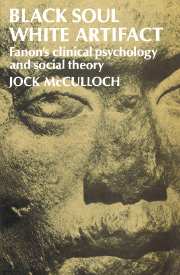Book contents
- Frontmatter
- Contents
- List of abbreviations
- Introduction
- Chapter 1 The three paradigms: negritude, ethnopsychiatry and African socialism
- Chapter 2 Negritude
- Chapter 3 Ethnopsychiatry and the psychopathology of colonialism: Fanon's account of colonised man in ‘Black Skin White Masks’
- Chapter 4 From psychiatric practice to political theory
- Chapter 5 Culture and personality
- Chapter 6 Class conflict and the liberation of Africa
- Chapter 7 The failed revolution
- Chapter 8 The neo-colonial state
- Chapter 9 Towards a critique of Fanon's class analysis
- Chapter 10 Conclusion
- Appendix I Fanon and Mannoni: conflicting psychologies of colonialism
- Appendix II Mental health in Algeria
- Notes
- Select Bibliography
- Index
Appendix I - Fanon and Mannoni: conflicting psychologies of colonialism
Published online by Cambridge University Press: 07 October 2009
- Frontmatter
- Contents
- List of abbreviations
- Introduction
- Chapter 1 The three paradigms: negritude, ethnopsychiatry and African socialism
- Chapter 2 Negritude
- Chapter 3 Ethnopsychiatry and the psychopathology of colonialism: Fanon's account of colonised man in ‘Black Skin White Masks’
- Chapter 4 From psychiatric practice to political theory
- Chapter 5 Culture and personality
- Chapter 6 Class conflict and the liberation of Africa
- Chapter 7 The failed revolution
- Chapter 8 The neo-colonial state
- Chapter 9 Towards a critique of Fanon's class analysis
- Chapter 10 Conclusion
- Appendix I Fanon and Mannoni: conflicting psychologies of colonialism
- Appendix II Mental health in Algeria
- Notes
- Select Bibliography
- Index
Summary
Fanon's critique of Mannoni's Prospero and Caliban found in his first work, Masks, is important to an understanding of Fanon's theory of decolonisation. This relevance is suggested by the proximity of the two works in terms of both subject matter and methodology. In fact the purposes of Masks and Prospero are strikingly similar: each represents an attempt to provide a psychology of colonialism dealing with both parties to the colonial experience; to explain how colonial rule is both possible and necessary; and finally, to uncover the psychological, and by implication the political, preconditions for the development of an independent personality. Although Fanon and Mannoni deal essentially with what are individual cases, Fanon with the Antilles and Mannoni with Madagascar, both are willing to claim that the results of their research are applicable to the situation of all colonised peoples.
The bitterness of Fanon's attack upon Prospero, and the repeated asides directed against Mannoni which appear in all of Fanon's major works, cannot be adequately explained in terms of an ideological conflict over nationalism. Fanon's antipathy toward Mannoni was part of the contempt for what he believed to be the covert project of most social science in the colonial world. However, Mannoni represented a far more formidable opponent for Fanon than either his predecessors, such as Porot, or his contemporaries, such as Carothers.
- Type
- Chapter
- Information
- Black Soul, White ArtifactFanon's Clinical Psychology and Social Theory, pp. 213 - 221Publisher: Cambridge University PressPrint publication year: 1983



